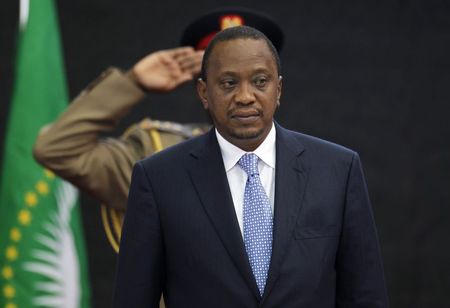By Thomas Escritt
AMSTERDAM (Reuters) - The International Criminal Court case against Kenyan President Uhuru Kenyatta collapsed on Friday as prosecutors admitted they lacked evidence, casting doubt on whether the decade-old court can hold the powerful to account.
In a court filing, prosecutor Fatou Bensouda said Kenya had not handed over the bank and telephone records that the decade-old court was demanding, leaving them without a case ahead of the scheduled October 7 start date.
The case against Kenyatta, accused of stoking lethal inter-ethnic violence after Kenya's 2007 presidential elections in which 1,200 died, had been postponed several times as prosecutors tried to gather evidence against him.
The collapse of the case is a severe blow for the Hague-baesd court, the first permanent war crimes tribunal, which was set up with the aim of ensuring that people accused of the most serious international crimes face justice.
"The accused person in this case is the head of a government that has so far failed fully to comply with its obligations to the Court," ICC prosecutor Fatou Bensouda said in a filing, asking judges to adjourn the case indefinitely.
Judges could respond to the filing by throwing out the case, bringing the case against Kenyatta to an end.
But a prosecution lawyer told Reuters they hoped judges would agree to a highly unusual permanent adjournment, which would indicate the case had failed because Kenya authorities had obstructed the investigation.
A DARK DAY
In Naivasha, just north of Nairobi, where some of the worst violence occurred, victims of the violence said the collapse of the case was a dark day.
"All our hope in getting justice after the 2007/08 chaos lay with the ICC but this has been crushed," said Esther Auma, a worker at a flower farm who said she lost her elder brother during the violence.
Kenyatta, the son of his country's founder, was elected president in 2012. He immediately began rallying Kenya's African Union allies in a diplomatic push to have the charges against him dropped, along with those against his deputy, William Ruto, who is already on trial on separate but similar charges.
But the case against Kenyatta also struggled in the courtroom, with prosecutors saying star witnesses had been intimidated into withdrawing their testimony against the president. Kenyatta's lawyers rejected the allegations.
Kenyatta supporters said the failure of the case proved that the ICC's charges had been politically motivated.
Prosecutors had asked for the phone and bank records in a last ditch attempt to find evidence to shore up their case. They argued that if Kenyatta really had paid agitators to stir up violence, the transactions would show up in his bank accounts.
The report had no obvious effect on the value of Kenya's national currency, the shilling, indicating the extent to which investors had already factored in the collapse of the case.
For the court, with a string of failed prosecutions behind it, the development raises questions over whether it will ever be able to hold to account the powerful, prosecuting alleged perpetrators behind the most serious crimes.
The court has handed down two guilty verdicts since being set up in 2003, against two little-known Congolese warlords, and one acquittal. Other targets, like Sudanese president Omar Al Bashir, wanted for genocide, remain at large with impunity.

(Reporting by Thomas Escritt; additional reporting by Antony Gitonga in Naivasha, Kenya and Edmund Blair in Nairobi; Editing by Tom Heneghan)
